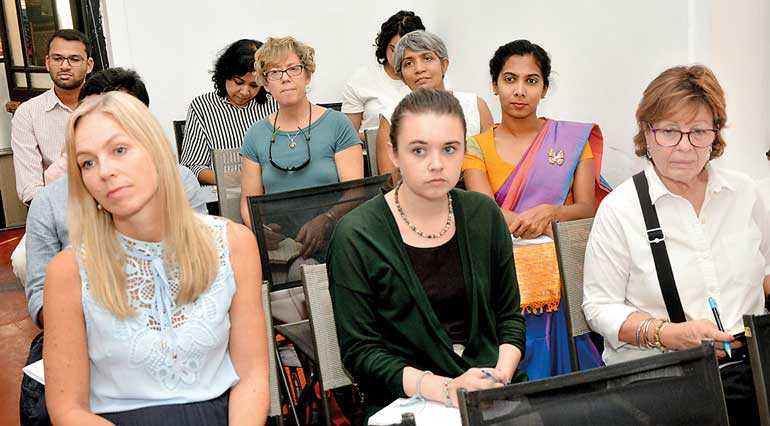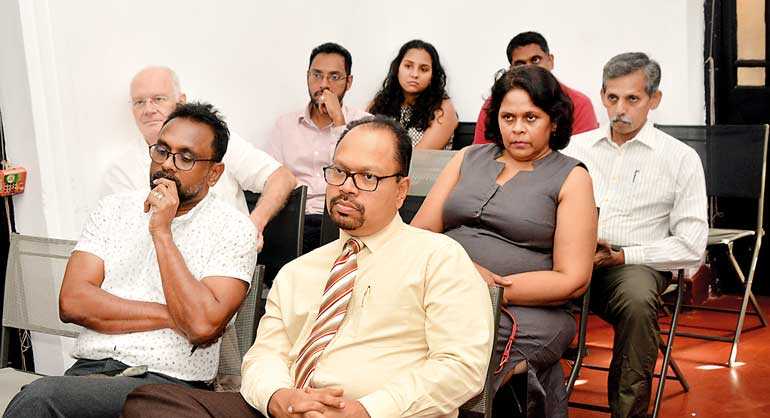Wednesday Feb 25, 2026
Wednesday Feb 25, 2026
Thursday, 10 January 2019 00:09 - - {{hitsCtrl.values.hits}}


By Divya Thotawatte
Clear and accurate policymaking will get more community involvement while a country’s politicians should be selected not through qualifications but for their talents to get people to trust them, said a young female politician of Sri Lankan heritage from Norway, Kamzy Gunaratnam.
Gunaratnam, speaking at a recently held guest talk on youth and women’s representation in governance, said that people believing in their politicians and politics was the most important for a country to be stable.
|
Oslo Deputy Mayor and Labour Party politician Kamzy Gunaratnam |
Gunaratnam’s insights come from her experience of being elected Deputy Mayor of Oslo from October 2015, and from being the leader of the Workers Youth League (AUF) in Oslo, and from her active membership in several bipartisan organisations, such as Tamil Youth Organisation and Youth against Racism.
According to her, everything that a politician does needs to end up in fact that people believe in policymaking and that policymaking leads to whatever the country needs. “That’s not the situation today, unfortunately people don’t trust the politicians and politics.”
To get better engagement from the youth, she believes that it would be wiser to reduce the age of voting to 16. “The age for voting is 18 in Norway, but my dream is to reduce it to 16. There are a lot of reasons for that and I believe that if you start voting when you’re still in school then the engagement will continue.”
Gunaratnam also believes that even though when 16-17 year olds are engaged in politics of a country, sometimes they lose interest in it when they get to their millennial gap. One of the problems amongst youth is that the young adults don’t trust politicians and politics. “Average millennial doesn’t want to commit to one political party,” she said.
Millennials don’t trust politicians because they don’t do what they say they will do. One way that politicians could win their trust, according to her, is not promising too much when policymaking and, during campaigns and elections. Even though there are a lot of things that will surely be done, it is best to pick a few of the most important things when going for the campaign so that it would be easier for the people to trust and top comprehend as well.
“Just run for election on one issue, and that will be your main goal for your period. Work on other things, but don’t talk about them, because the public usually doesn’t get everything that is happening. For example a 16-year-old, how much do they know? They need to understand the politics. Policymaking and what we front as our main issue should be clear and acute and, if it’s not acute they will say that you’re just talking,” she advised.
Furthermore, Gunaratnam pointed out that when people are not represented in the most important places in the world, that’s when the mistrust begins. Politicians should not be elected or selected due to their qualifications, or the school that they studied in, but by giving prominence to their capabilities.
“If there are structures in society making some people more qualified to be politicians, then that’s inequality.”
People need politicians who represent them, when they don’t feel like the politicians are representing them, that’s when they give up on politics.
Gunaratnam also explained how necessary it was for the youth to understand politics and the state of the country and other issues while growing up, and the society’s contribution to help them understand and analyse the issues of the country.
Referring to Norway 2011 attacks she noted, “The guy who did this was born and raised in Oslo. He was not crazy. My question to the society was, ‘How do you make sure that this never happens again?’ To do that we can’t just look at what he’s wearing, we have to look at who failed. Was it his parents, his kindergarten, or the school system? During the trial it was proven that everyone failed. He was failed in so many levels that you can’t just stand by and just point at one direction. When this happened, he wanted to kill the youth because the youth was the future who usually runs the country and he didn’t want more of that policy.”
The young politician also promotes gender equality in governance. Seeing a woman being a leader affects the women seeing it because those things has an inspiring effect that we can’t measure, she stressed. Also she believes that any political party needs a women front for it to be stable and to be more in accordance with their policies, as well as to inspire women to get involved in local governance.
The main issue as seen by Gunaratnam is that there is a lack of confidence in the people’s and also the politician’s minds about women and, their capabilities in leading a nation. “We have 50%-50% on our list, like every other person is women when we run for elections, but then personal votes count up and then there are only men elected. That’s because we still think that man is better than women.”
To encourage more involvement from women, it is important that people believe more in their capabilities and talents, not only related to politics, but in any area so that they would be further encouraged to serve their best. She emphasised that a lot of women quit after a short period of working because they are not encouraged enough to continue their work. Therefore it is necessary to encourage and mentor them.
“You need more structural work like, you need to put people to mentor the new women so they actually don’t give up, because we have a problem, women run for election and they do it well, but they resign after one term. It’s very common, in all the parties.”
She also highlighted the fact that the society views the behaviour of men and women in different ways, where in most cases women are judged for their attributes and leadership qualities. “I speak strictly a lot and people then say I’m a little ‘bitchy’ and when a man talks just like me they say that’s just ‘leadership’. If we can put systematically both men and women in those different roles then we will have that conservative gender structure in our head and that’s what we bring over to our children,” she elaborated.
While promoting equality, Gunaratnam also believes in the right for same sex marriages. “I think everyone should live their life as they want to live it.”
Additionally, the young Norwegian politician stressed on the fact that in order for a country to grow and for the citizens to be happier, the citizens too, on their part should pay their taxes while trusting politicians and the work they do.
“Norway is ranked as the best country in the world, the fastest growing capital, etc. The ranking that I like is ‘where the happiest people live’. We like our bureaucrats, in most countries we really hate them you know. People don’t trust the bureaucracy. You have to trust the bureaucracy and pay the tax and it’s spent well. I also believe in progressing taxing in which the more you earn, the more you pay,” she said.
Pix by Upul Abayasekara